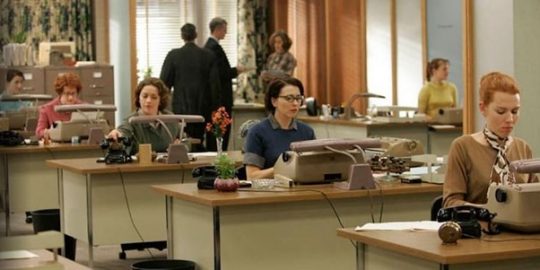- Your cart is empty
- Continue Shopping
What is an Ergonomic Chair?
According to Ergonomic Trends, “an Ergonomic Chair is one that not only follows best practices in terms of proven ergonomic
An old fashioned typist chair is categorised by the absence of armrests, a small seat and backrest, and simple height adjustment.  Traditionally these chairs were very basic in their design and were used predominantly by females in ‘typing pools’. Not only has the era of typewriters and traditional typist chairs moved on, but so has our awareness of the ergonomic workplace requirements of a seated person. What happens to your body when you sit? We now know that chairs with such limited adjustability are bad for our backs and body in general, and as a result modern ‘typist’ chairs that are available for sale have more ergonomic features to prevent back and other health-related problems. What is the right home office chair for me?
Traditionally these chairs were very basic in their design and were used predominantly by females in ‘typing pools’. Not only has the era of typewriters and traditional typist chairs moved on, but so has our awareness of the ergonomic workplace requirements of a seated person. What happens to your body when you sit? We now know that chairs with such limited adjustability are bad for our backs and body in general, and as a result modern ‘typist’ chairs that are available for sale have more ergonomic features to prevent back and other health-related problems. What is the right home office chair for me?
Instead of sitting behind a typewriter all day, most of us now spend the majority of our day on a keyboard behind a computer. Our choice of available swivel office chairs for different work applications, is huge. Ergonomic chairs and orthopedic chairs for back problems, are just some of the modern ‘typist chair’ choices!
The correct way to adjust the height of a typist chair is by doing so away from the desk. Here is a brief summary, or if you prefer, watch our detailed video:
Video Guide:
How to correctly setup your typist chair, desk and monitor.
There are some many typist chairs available for sale, so if you are working from home, avoid buying a cheap one as the long-term impact on your health and wellbeing is simply not worth it! The 5 most important features on a home office chair.
Do you have a bad back and need some expert advice on preventing back problems and selecting the right executive, typist, orthopedic or heavy-duty office chair? Contact us or book an Ergonomic Assessment where our team of experts will happily assist you with your requirements.
According to Ergonomic Trends, “an Ergonomic Chair is one that not only follows best practices in terms of proven ergonomic
What is an orthopedic office chair and how does if differ from an ergonomic chair? Which is best for chronic lower back pain?
Office chairs have an array of levers and knobs to adjust the backrest, seat and armrests. How do you achieve a healthy sitting posture?